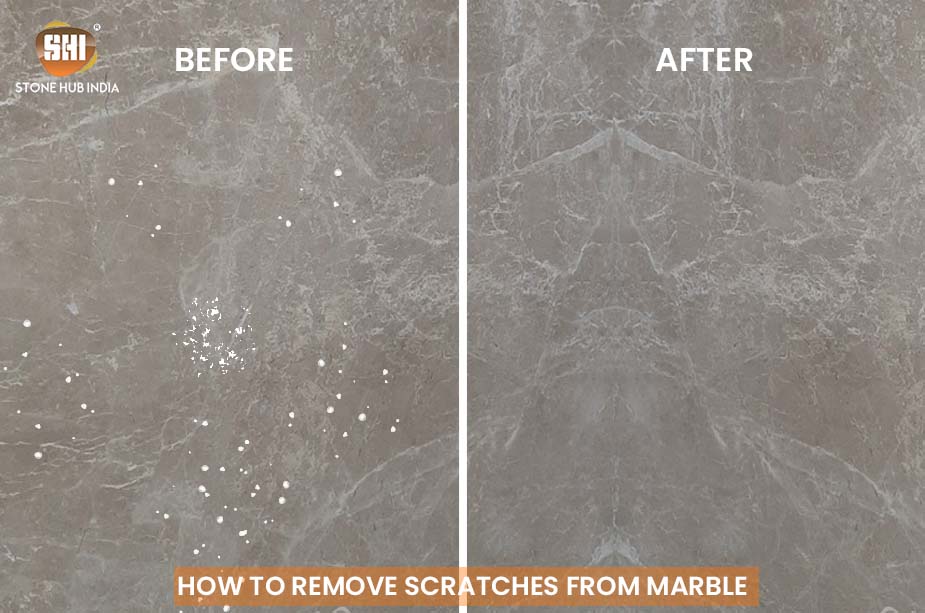How to remove scratches from marble
Marble is a beautiful natural stone that is used widely in homes, offices, and other commercial places to make it look classy and pristine. However, when your marble is scratched or etched you find it bad in presence, it can have a dull appearance that is a poor use of your marble material. So many questions arise in mind about appearance, prevention, and scratches when we use marble.
How do we get scratches on marble
Marble etching means damage to the stone or the marble coming into contact with certain substances containing acids including coffee, citrus, wine, tomatoes, alcohol, and juice. Acidic substances like lemon juice, orange juice, wine, etc. are the worst enemies for marble, and cause of that your marble gets etched. Scratches are the result of the top layer of the marble wearing away due to the stain. Water stains are a common issue with marble floors, countertops, etc. These seem transparent or chalky dull spots. Marble stains when a substance gets into the pores of the stone which causes black marks on marble.
Why is your white marble turning yellow
The most general cause for white marble turning yellow is iron, which can be found in many types of marble. When comes in contact with water, acids, or bleach, the iron in the stone will begin to oxidize and turn yellow When a polished marble countertop has only a few scratches, it's often possible to remove scratches and restore the shine by rubbing with a soft cloth and a paste made of water and a marble polishing powder. Some steps you can follow to remove scratches dust or easily removable are.
-
Cleaning
Firstly, mix warm water with mild dish soap and then apply on the surface of scratch. Wet a soft cloth in the mixture of water and dish soap. Then, wring the cloth out so it is just damp and gently rub the area of the scratch with a slightly moist cloth. After this, rinse the surface with a different wet soft cloth that was dipped in just warm water.
-
Buffing
It should be done in a circular motion with a dry soft cloth. Rub in a gentle motion, with a bit of elbow grease and buff out the scratch until a shine come through your marble surface.
-
Polishing
Lastly, you can polish the marble. Polish brings back the shine of your marble but to avoid streaks of your marble make sure to use it in a circular motion.
-
Sealing
Sealing means a layer of wax or synthetic sealer which protects your marble. If you have polished your marble with powder, your marble would have gotten its material exposed to the elements and would degrade over time due to water damage, oil spills, and more. If this cleaning process does not help you to remove scratches from your marble then you can try fine grain sandpaper but if neither method work then deep scratches are on your marble and you will require professional help to remove them.
How Can You Prevent Scratches happening on Marble
Marble is more porous than other common materials like “quartz” so it can be vulnerable to staining and etching (a.k.a light scratching or physical changes There is no true way to prevent any scratches.
but exercising caution around the surface will be the best way to try to avoid scratches. While this will not necessarily keep scratches away, cleaning marble regularly and applying a sealant when necessary are very important aspects of caring for the stone.
- Daily cleaning : For routine maintenance of marble, for marble floors, you want to avoid anything coarse on the surface, and dirt and sand being dragged around by a vacuum could do more damage than you intend. You catch quickly, warm, soapy water is the best for cleaning, just make sure to rinse well, sop up any standing water, and thoroughly dry the surface. Also note that for marble, acid is kryptonite-so keep it away from the surface.
- Pesky stains : If you don’t catch a spill immediately, for most organic food stains, cleaning with a solution of 12% hydrogen peroxide and a few drops of ammonia is a better option and this cleansing method is recommended by the Marble Institute. If you spilled oil-based substances then liquid cleansers like acetone, household detergent, etc. are the best options for immediate cleaning.
Conclusion
There is a multitude of reasons why marble can get scratches. Acidic cleaning solutions are the biggest culprits for etching marks, but deep scratches can come from dragging furniture around, accidents, and shoes like heels and cleats.
In case you want to change your marble flooring then Stone Hub India has the best-imported marble for flooring which is stain & scratch resistant.

